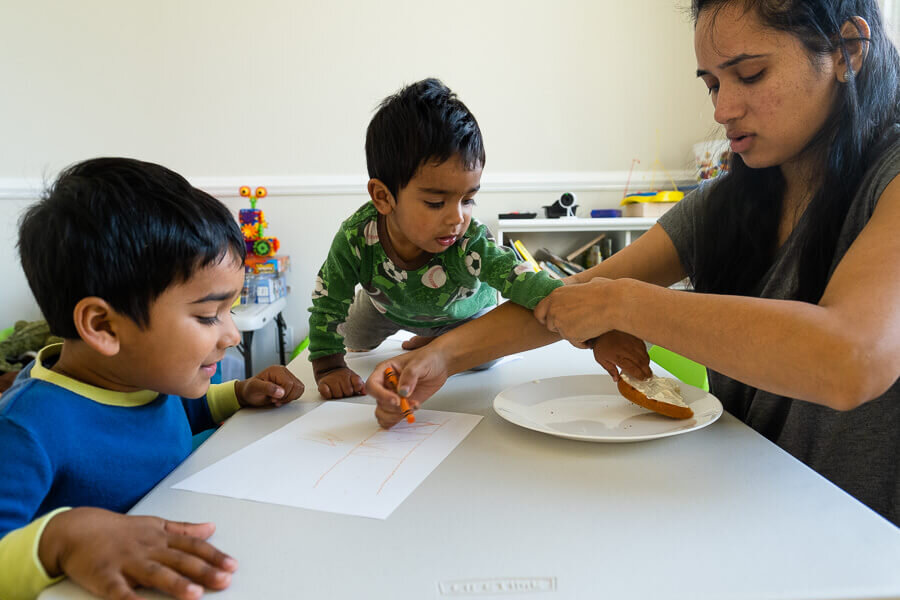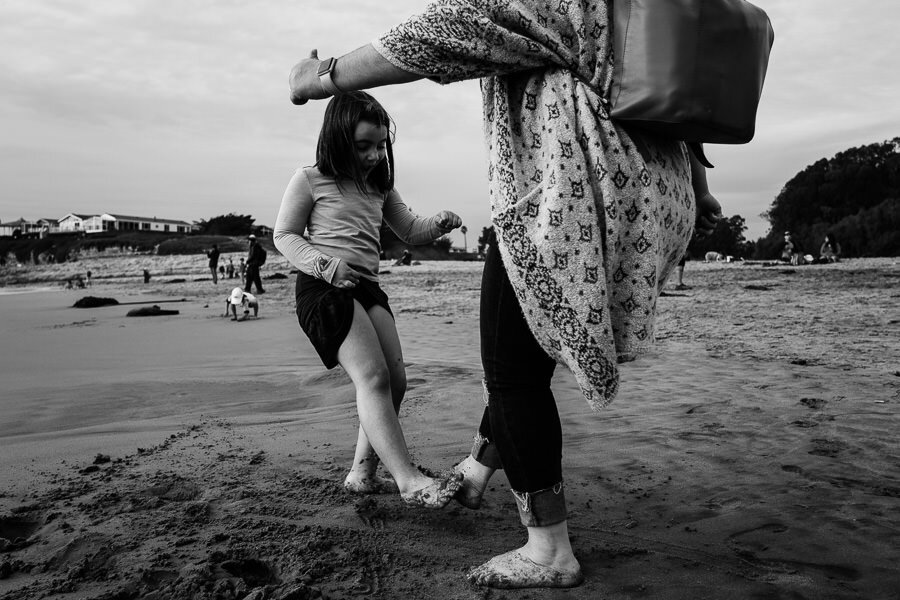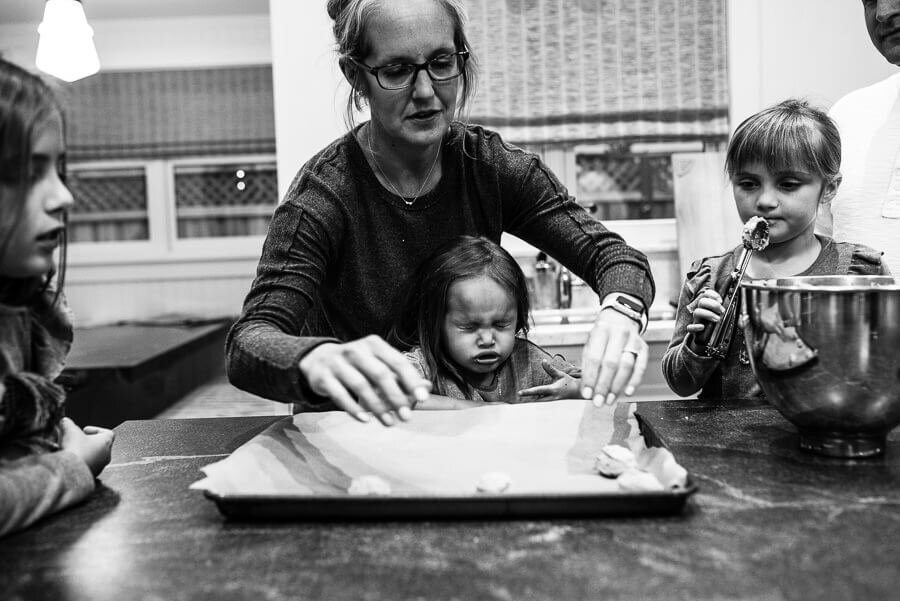8 tips to slow down childhood
After working with families for 15+ years now, I've learned a thing or two about parenthood. Something that has stuck with me is how everyone seems to feel that their days with the kids go on forever, but somehow the years still seem to go by (way too) fast.
I don't have kids, but I can for sure relate to how much the passage of time has sped up in adulthood. I've been experimenting with slowing down my time in the past year or so, and thought of how this experiment could relate to slowing down the fast pace of childhood for parents:
Focus on one thing at a time
We tend to pride ourselves on our multitasking abilities because it feels like we are being productive. Research has shown that multitasking actually makes us less productive, results in more mistakes, and wastes time and energy every time we switch between tasks. This is why multitasking speeds up time perception, because we aren't fully immersed in something to give it our full attention.
We simply can't multitask if the tasks require the same part of our brain. Walking the stroller and listening to a podcast works well because one activity is automatic and does not mess with our language center. But writing a text while listening to your first grader talk about their day will make you drop the ball on at least one of those language-center-using tasks. Time will feel like it was wasted, even though multitasking was meant to save time.
Actionable tip: Avoid multitasking and focus on just the one thing at a time to make time feel more expansive.
Say no
Saying "no" can be really freeing once you get used to the benefits of it. Saying no to commitments, people, chores, kiddo hobbies, purchases, to dos, and projects that don't add to your life. And even commitments that do add to your life, but keep you from things that you would rather be doing if you're being honest. Stuffing too many things into your life will make time feel rushed, instead of slowed down.
Actionable tip: Write down everything that goes on during a regular week in your family's life. Hobbies, playdates, social events, after work meets.
Do these things bring you joy and make your life feel fulfilling?
Do they drain you or keep you away from what you most value?
Start decreasing the time you spend on those draining things – or completely take them off your plate – unless they are life necessities. Learn to say no to the types of invites you would go to simply out of obligation. This gives you more space and freedom in your schedule. When you're not speeding through traffic with half-dressed kids to get to your next commitment, time will feel slower.
Move your body
You may have had an afternoon when you parked the kids in front of Netflix, nuzzled up next to them while you surfed the Internets shopping or reading the latest gossip. Did that day go by surprisingly fast?
How about a day when you spent a couple hours walking the kids around town, went people-watching, engaged in duck-feeding, or explored a new trail with them – did it seem like time really expanded? Did your day feel rich and full because of that experience?
Tip: Choosing rich and fulfilling experiences instead of time-sucks will help your time slow down, and it's a safe bet that it should involve moving your body.
Step away from screens
When you catch yourself having scrolled Instagram or social media for an hour (or two), do you feel like you can't believe how much time went by? Maybe you turn off your screen just to turn it on again, to see if the clock was wrong the first time around? Getting lost in our screens seems to have that effect.
Actionable tip: Have a designated spot for your phone at home – and keep it there. You can leave the sound on so that you hear it incase someone *really* needs to reach you, but this way you can't fish the phone out of your pocket every few minutes. Remember, most things on your phone are designed to grab and hold your attention so that you'll keep consuming things out there, instead of focus on your life right here. Being fully present instead of distracted will help you slow down time.
Stay curious and soak up the details
Our brains developed to decide whether information around us is relevant or irrelevant for survival. When the brain is faced with something new, it stores it in your memory because it's not sure yet if this is important or not. When the brain is faced with something familiar over and over again, it not only starts paying less attention to it, but it fails to record it into your memory.
When you were a kid, absolutely everything was new to you all the time, which lead the brain to record A LOT of data and memories in there. This is why childhood years seem to last forever.
As adults, our routines often look identical day in and day out, which makes the brain kind of check out, unless something surprising or different from the usual happens. This makes the years seem shorter.
Actionable tip: Keep your eyes and ears peeled for newness in your ordinary routines. When a moment happens that you want to remember, really soak up all the details and let your mind linger in them, to help your brain recognize this as something to record. The more memories you manage to soak up, the longer time will have felt as you look back on it.
Plan for novelty
Because your brain records new things into your memories, use it to your advantage! Expand your perception of time than by planning for some new things. (And this does not necessarily have to involve more money.)
Actionable tip: Plan for a bit of newness at least once a week. Go to a different park with the kids. Drive home from school through a different route (that may or may not involve a stop at the ice cream place). Walk to the local coffee shop instead of taking the bus. Have a dance party with your daughter in the kitchen. Try a new muffin recipe and let your toddler be in charge of the chocolate chips.
Journal about your days
Because our brain doesn't deem it important to record all the things we do throughout our everyday routines, I've started journaling 2-4 memories in bullet point form at the end of each day. If there was something out of the ordinary that happened, even better! This way, when I feel like a whole month went by SO FAST, I can look at my journal and see that quite a lot of things happened too. Immediately I realize time went a lot slower than I first thought.
Actionable tip: Grab a notebook (or keep a digital note document on your phone), where you keep track of just a few things that happened each day. You can even focus on this once per week, if a daily record feels like too much. Remember to write down things that made your usual routine a bit different, or that changed your usual day up altogether. Being able to look back at this record of your time will make you see that you did accomplish a lot, which slows down your memory of that time.
Bonus tip: Use different types of bullets for different types of memories for easy scanning later on. I use hearts for relationship/friendship memories, a dollar sign for a purchase or investment, W for workouts, a tiny tree for a nature adventure, a plate for a restaurant visit... Using your imagination is a fun bonus, yeah?
Photograph and print your memories
Just as looking back on your journaling scribbles can help you feel like time was more expansive, looking back on photographs has a similar effect. You should not spend your days with your phone glued to your hands, but your phone can be a convenient tool for slowing down time when used intentionally.
Actionable tip:
Pay attention to when there's something a bit extra going on that you would like to remember. Grab your phone and take a picture that captures your memory, and then tuck your phone away again. (Instagram can wait.)
Be intentional with what you photograph, and on't fill up your photo folder too much. Purge the photos that were "misfires" and only keep the best ones. A couple photos per day is enough for you to remember the day – if you end up with 20-30 photos per routine day it will be too overwhelming to really go back to.
Schedule a time in your calendar, maybe once a month or once every quarter, when you order the photos you kept as 4x6 prints. Nations Photo Lab has nice lustre prints that go for around $0.30 for a 4x6 – if you print one photo per day for the year it would be just a bit over $100 to spend on something that the kiddos can rummage through year after year.
//
Documenting your year
I created a session package that includes documenting several touch points throughout a family's year to make the photo book showcase a longer period of time. If you're curious about documenting a year in your life, send me an email so we can talk.










